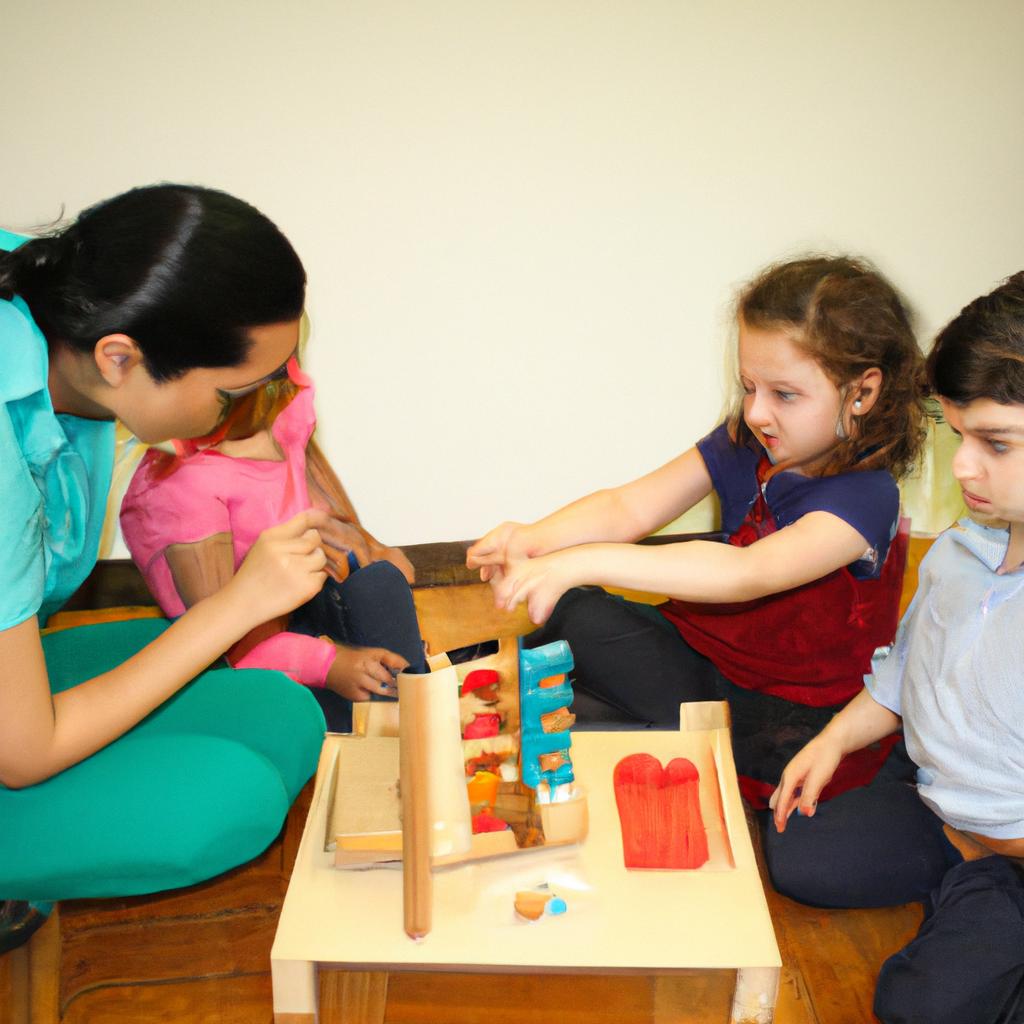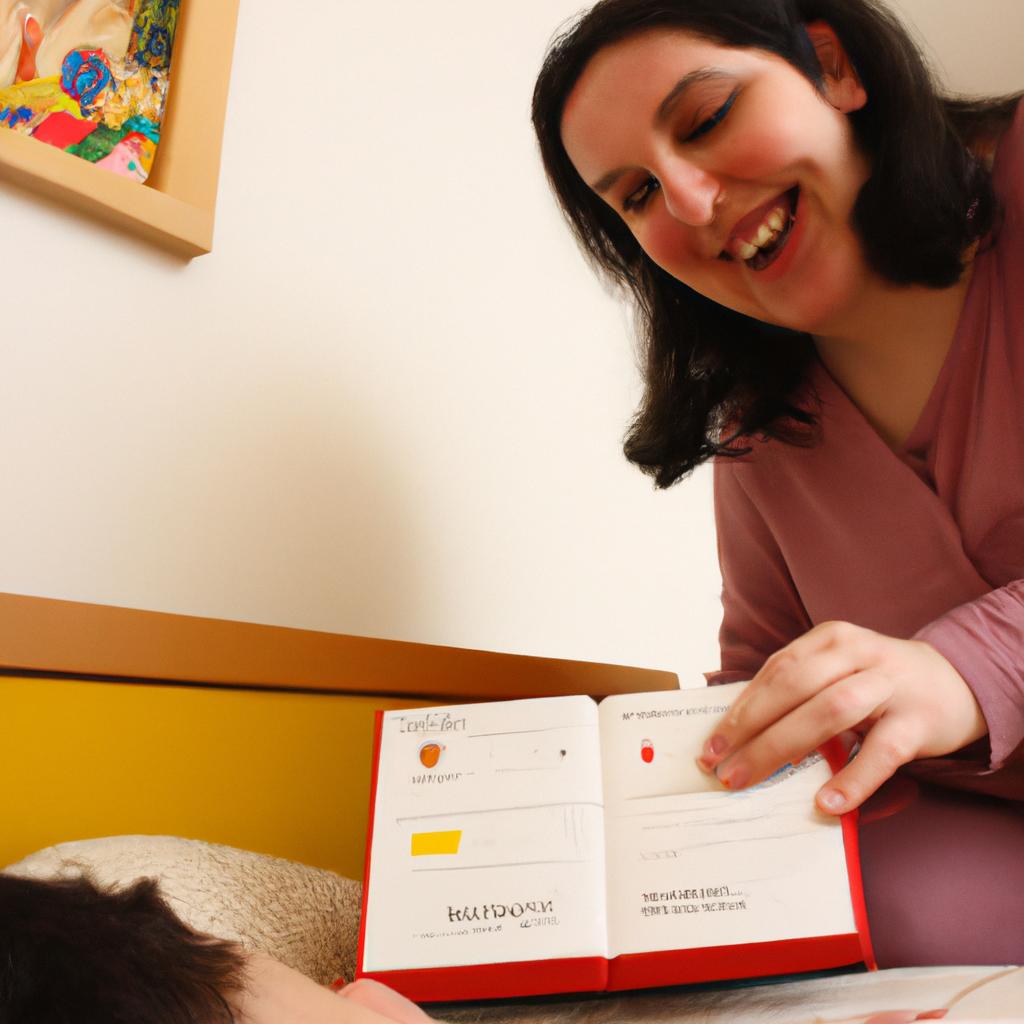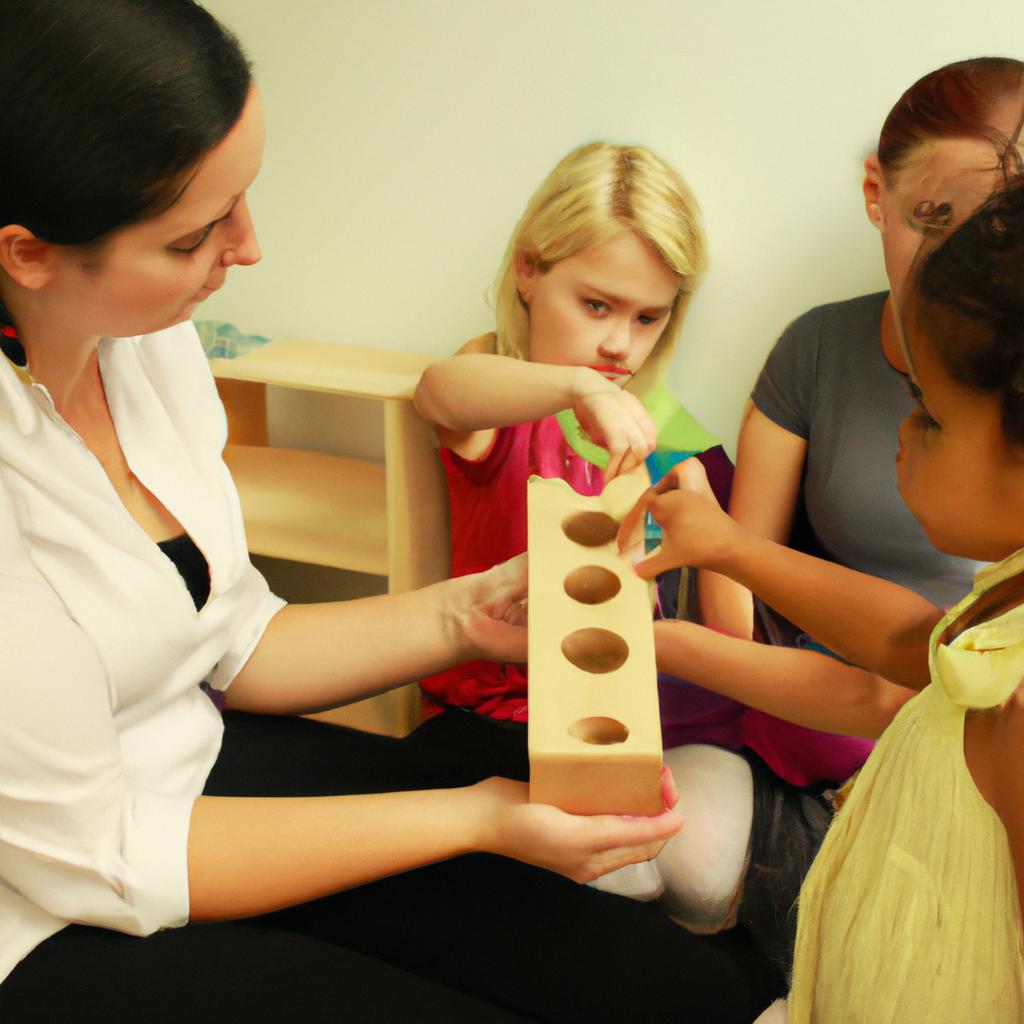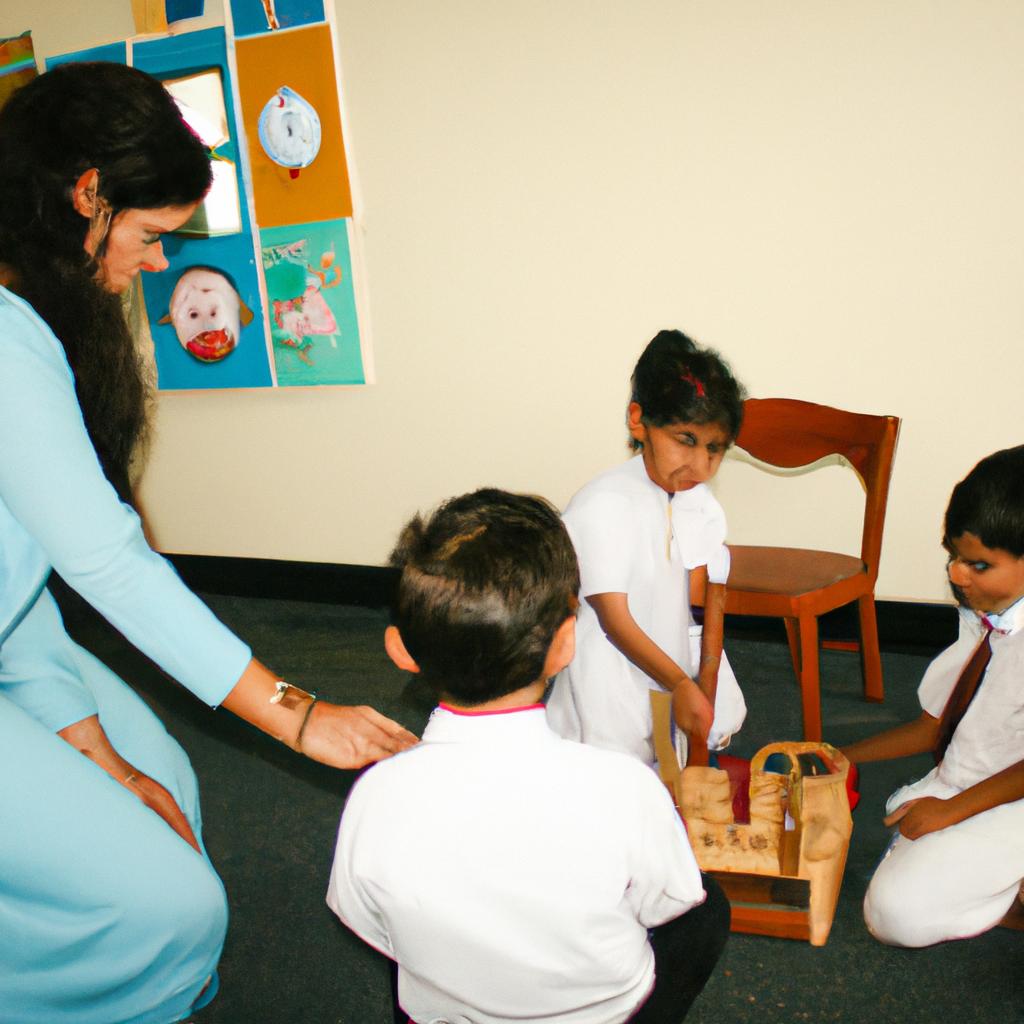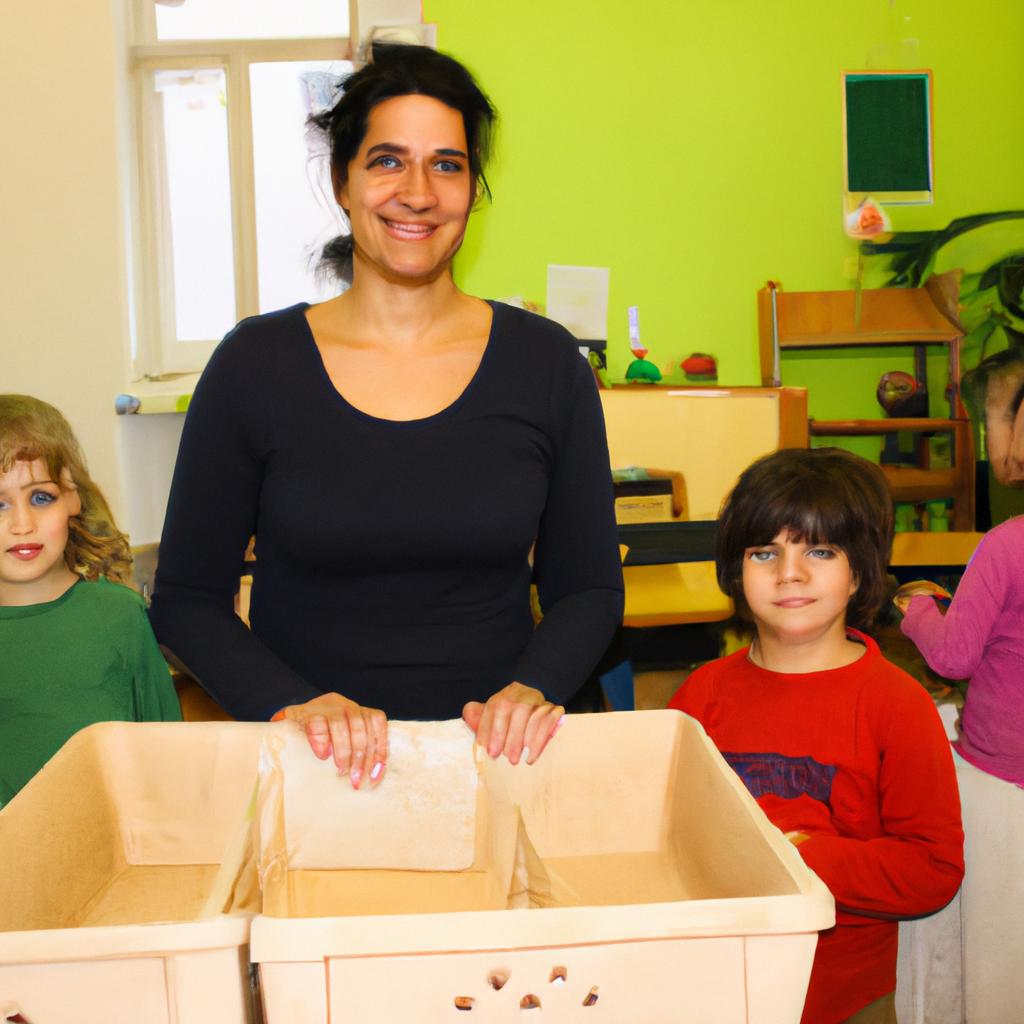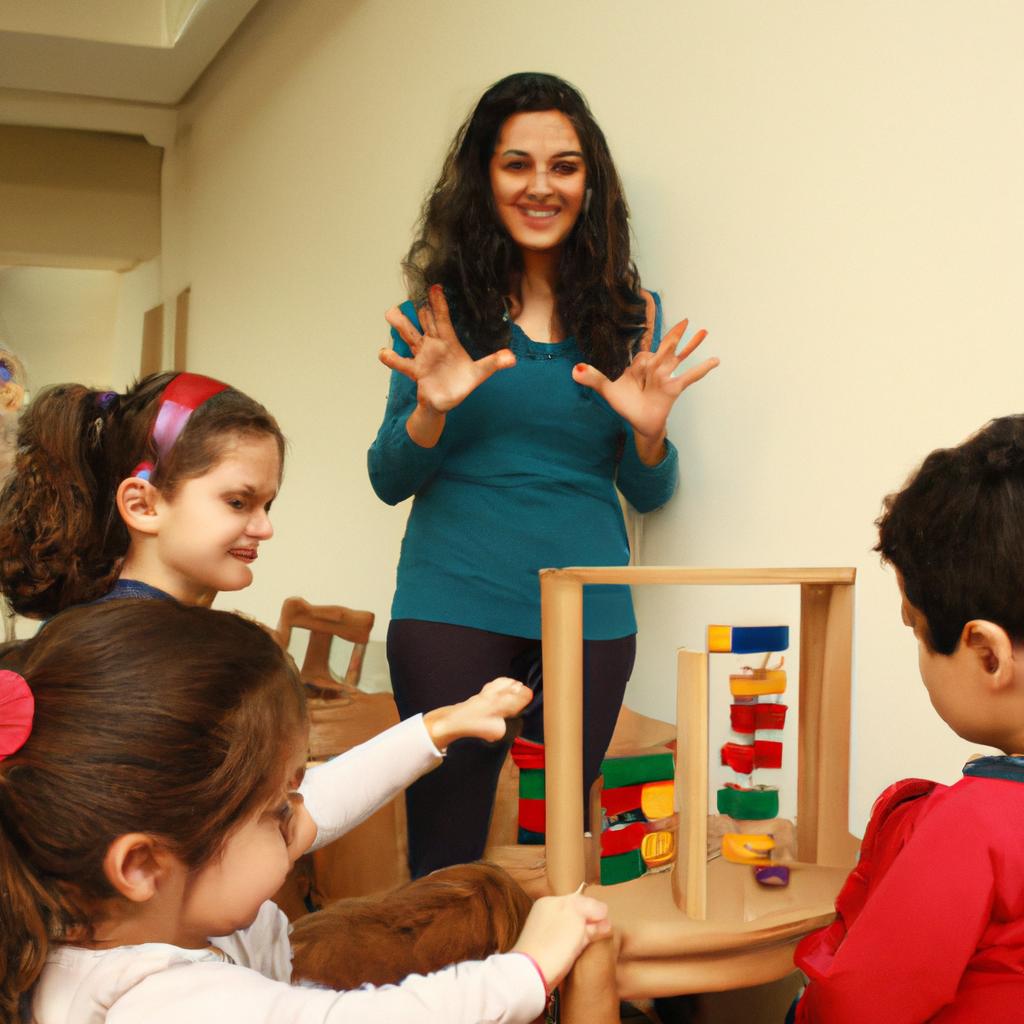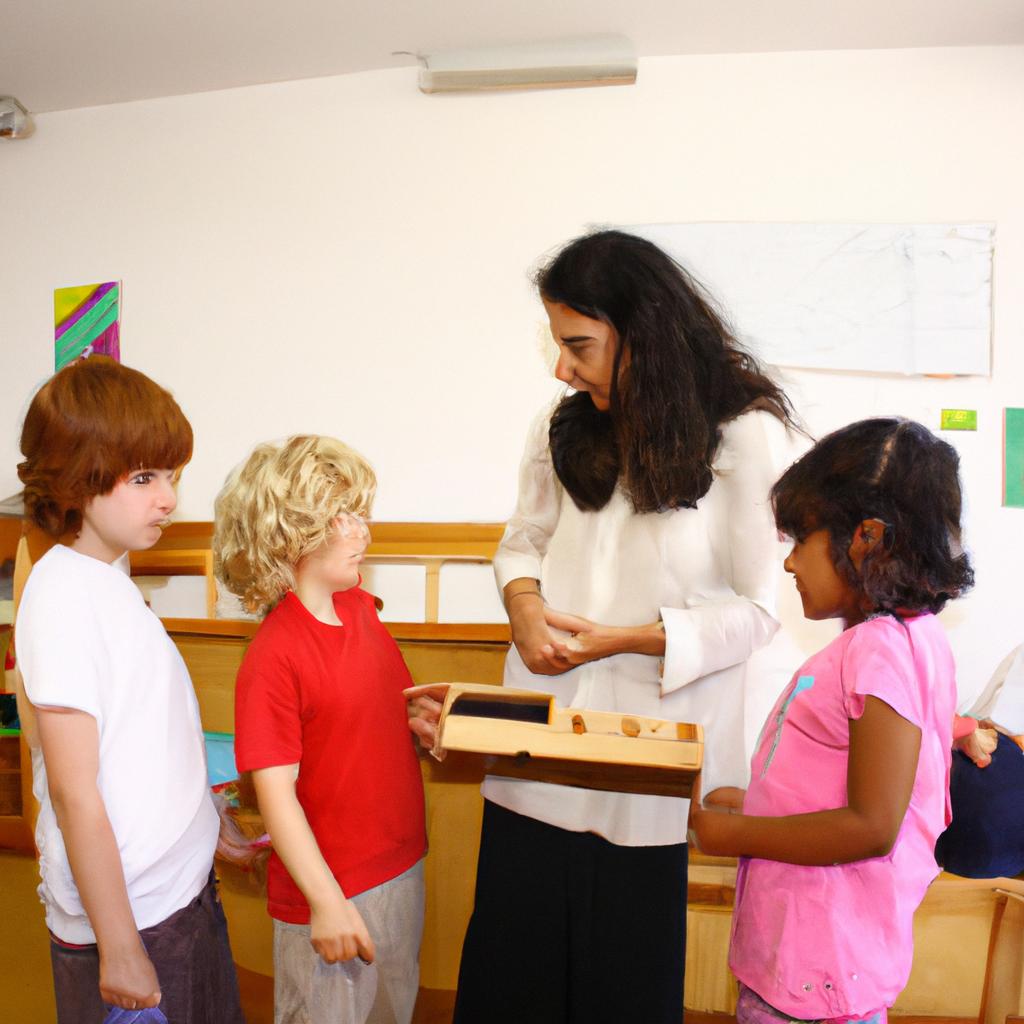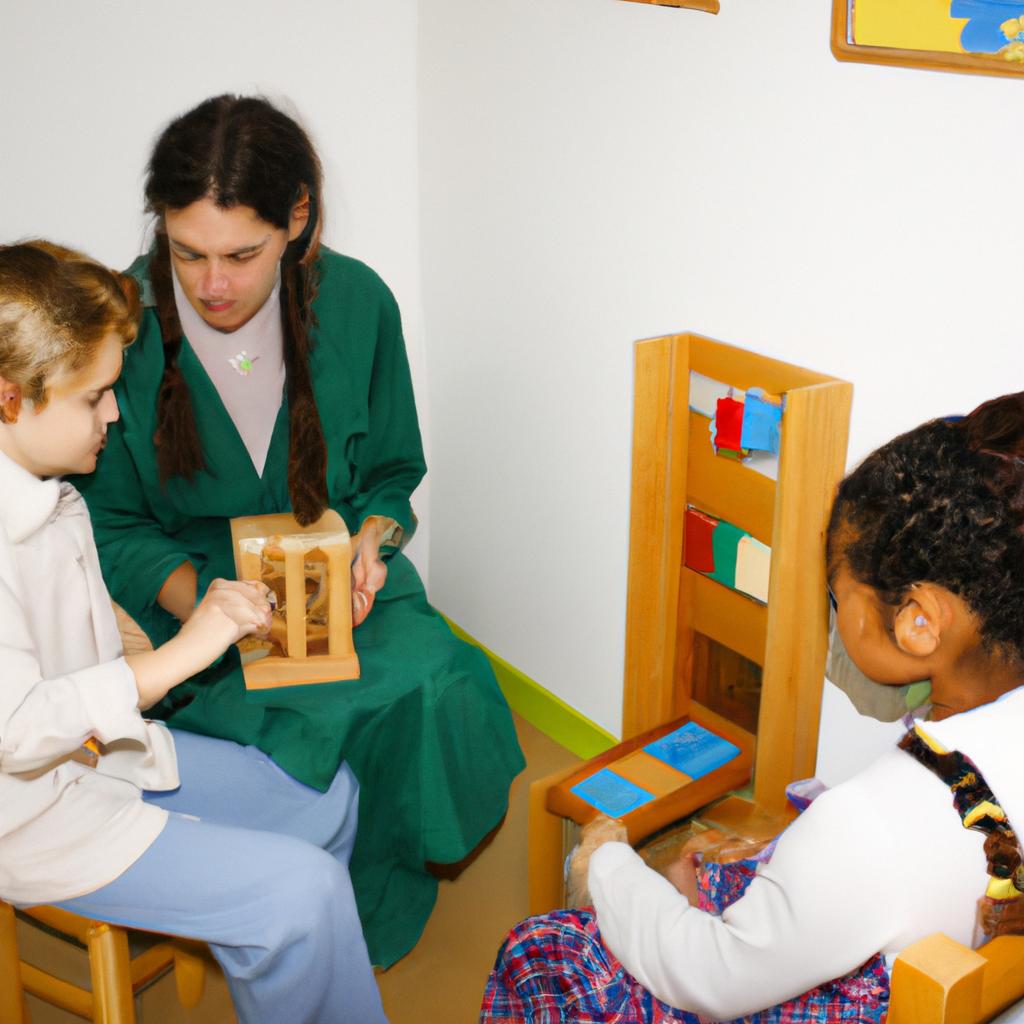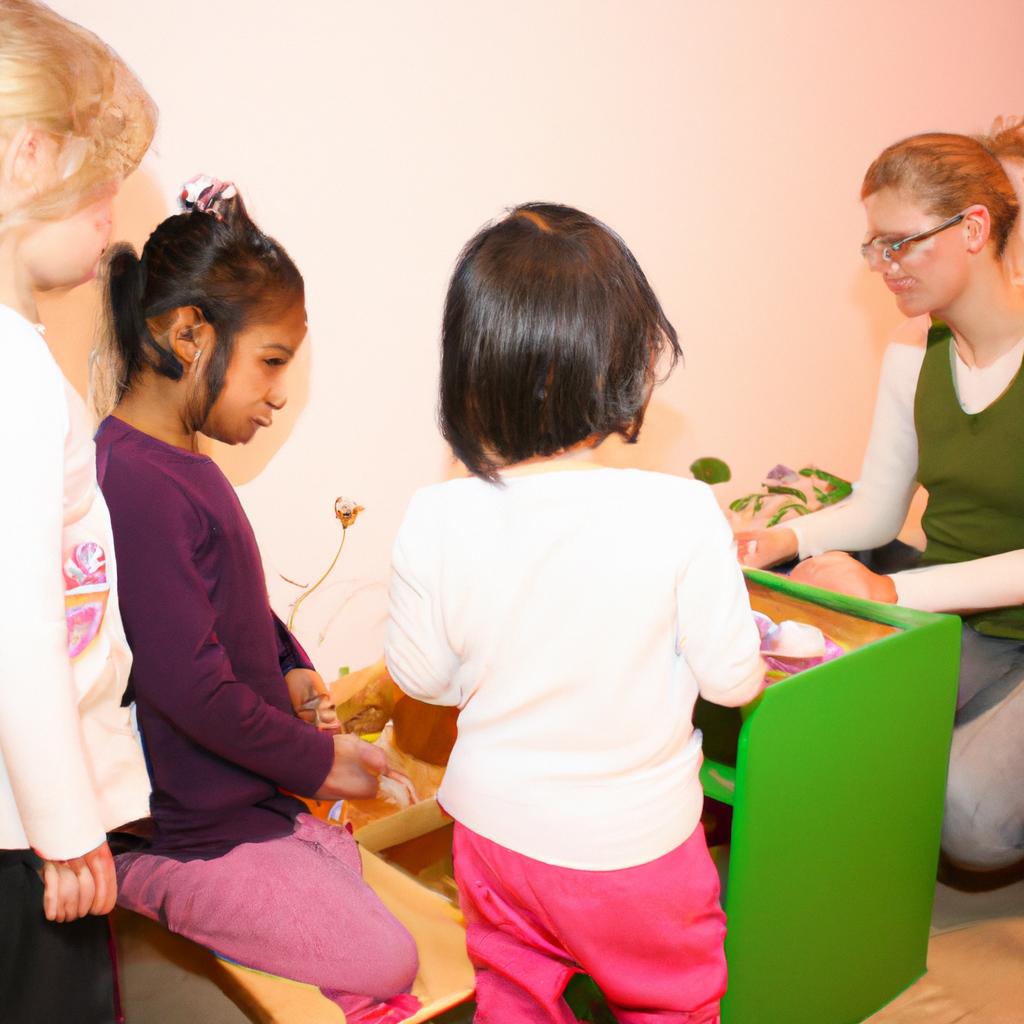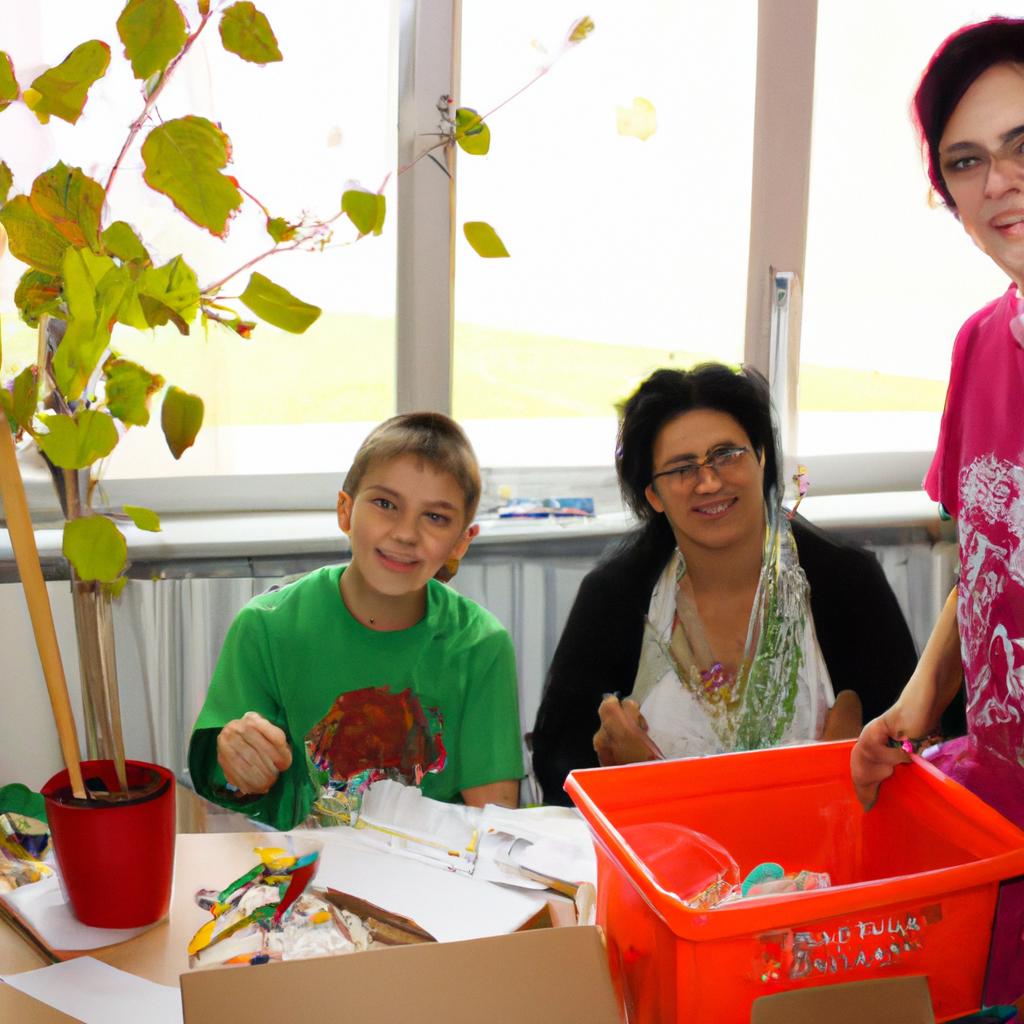Montessori education, renowned for its emphasis on independence and self-directed learning, has gained significant recognition in the field of early childhood education. The Montessori approach focuses on allowing children to explore their interests and develop at their own pace while providing a structured environment that fosters growth and development across various domains. This article aims to shed light on the importance of independence within the Montessori educational framework, highlighting its numerous benefits.
For instance, consider an imaginary case study where two preschool-aged children are enrolled in different educational settings: one follows traditional teaching methods, while the other experiences a Montessori education. In the traditional classroom, the child may be confined to rigid schedules and predetermined activities without much room for exploration or independent decision-making. On the contrary, in a Montessori environment, the child is encouraged to select tasks from an array of materials independently and work at their own pace. This freedom allows them to choose activities based on personal interest and curiosity, leading to enhanced motivation and engagement in learning processes.
Enhances critical thinking skills
Enhancing critical thinking skills is a fundamental aspect of Montessori education. By encouraging independence and self-directed learning, this approach provides students with the opportunity to develop their cognitive abilities in a unique and effective way. One example that illustrates the benefits of Montessori’s emphasis on critical thinking can be seen in the case of Emily, a five-year-old student who attends a Montessori school.
In her classroom, Emily is given the freedom to choose her own activities and work at her own pace. This autonomy allows her to explore different subjects and materials based on her interests and curiosity. For instance, during one particular week, she shows a keen interest in animals. With guidance from her teacher, Emily selects various books about different animal species from the class library and spends time studying them independently. As she reads through the pages, she asks herself questions like “What does this animal eat?” or “Where does it live?” These inquiries spark her critical thinking process as she seeks answers by analyzing the information available to her.
The focus on cultivating critical thinking skills within Montessori education goes beyond individual examples like Emily’s case study; it permeates every aspect of daily learning experiences for all students. To illustrate further how Montessori enhances critical thinking skills, consider these four key elements:
- A child-centered environment: The classroom setup promotes exploration and independent decision-making.
- Open-ended materials: Students are provided with diverse resources that allow for creativity and problem-solving.
- Collaborative discussions: Children engage in peer-to-peer conversations where they learn from each other’s perspectives.
- Teacher as facilitator: Educators guide rather than direct instruction, allowing students to think critically and find solutions.
| Key Elements | Description |
|---|---|
| Child-centered environment | Encourages independence and autonomy |
| Open-ended materials | Fosters creativity and problem-solving abilities |
| Collaborative discussions | Facilitate learning from peers’ perspectives |
| Teacher as facilitator | Guides students to think critically and find solutions |
By providing an environment that prioritizes critical thinking skills, Montessori education equips students with the tools necessary for academic success and beyond. Through independent exploration, open-ended materials, collaborative discussions, and supportive guidance from teachers, children develop their ability to analyze information, evaluate options, and form informed opinions.
This focus on enhancing critical thinking naturally leads into the next section of this article: how Montessori fosters self-motivation in students. By encouraging autonomy and independence in their learning journey, these educational practices instill a sense of intrinsic motivation within each child.
Fosters self-motivation
Transitioning from the previous section on how Montessori education enhances critical thinking skills, it is important to note that fostering self-motivation is another significant aspect of this educational approach. By encouraging children to take charge of their learning and explore their interests independently, Montessori education instills a sense of responsibility and ownership over one’s own education.
For instance, imagine a hypothetical scenario where a child in a Montessori classroom expresses an interest in plants and gardening. In a traditional educational setting, the teacher might provide some information about plants during a specific lesson or unit. However, in a Montessori environment, the child would have the freedom to pursue this interest more deeply by conducting experiments with different types of soil or studying plant life cycles. This kind of autonomy not only fuels curiosity but also develops problem-solving abilities as the child navigates through challenges encountered along the way.
To further emphasize the benefits of self-motivation within Montessori education, consider the following bullet points:
- Children gain confidence in their ability to make decisions and solve problems.
- Self-directed learning promotes higher levels of engagement and active participation.
- Students develop essential time management skills when given control over their pace of learning.
- The process allows for individualized instruction tailored to each student’s unique needs.
Furthermore, a table can be used to illustrate these advantages:
| Benefits of Self-Motivation |
|---|
| Confidence-building |
| Promotes independent decision-making |
In conclusion, fostering self-motivation is integral to Montessori education. By providing opportunities for students to pursue their interests independently, this approach cultivates valuable skills such as critical thinking, problem-solving abilities, and time management. As we delve into examining how Montessori education also develops problem-solving abilities next, let us explore how this educational method continues to shape students’ minds and prepare them for future challenges.
Develops problem-solving abilities
Building on the foundation of self-motivation, Montessori education also plays a crucial role in developing problem-solving abilities in students. By providing an environment that encourages independent thinking and exploration, children are empowered to tackle challenges with creativity and resilience.
One example of how Montessori education cultivates problem-solving skills is through its emphasis on hands-on learning experiences. For instance, imagine a child tasked with building a tower using blocks of different shapes and sizes. Instead of being told exactly how to construct it, the child is encouraged to experiment and find their own solutions. This process enables them to develop critical thinking skills as they analyze various possibilities and make decisions based on trial and error.
To further highlight the benefits of Montessori education for problem-solving development, consider the following bullet points:
- Encourages innovative thinking by fostering an open-minded approach.
- Cultivates adaptability by exposing children to diverse situations.
- Promotes persistence by allowing students to learn from mistakes.
- Enhances analytical skills through engaging activities that require logical reasoning.
Moreover, Montessori classrooms often incorporate materials specifically designed to challenge students’ problem-solving abilities. These materials may include puzzles, sorting games, or even real-life scenarios where children have to identify problems and devise appropriate solutions. Through such interactive experiences, children not only acquire essential academic knowledge but also develop important life skills that will serve them well beyond their time in school.
As we explore the significance of independence in Montessori education, it becomes apparent that promoting creativity and independence go hand in hand. By empowering students to think critically and solve problems autonomously, Montessori education sets a solid foundation for fostering creative thinking and nurturing individuality within each student’s educational journey.
Promotes creativity and independence
Building upon the development of problem-solving abilities, Montessori education also emphasizes the promotion of creativity and independence in students. By providing an environment that encourages exploration and self-expression, children are empowered to think outside the box and develop their unique talents.
For instance, let’s consider a hypothetical case study of a child named Emily who attends a Montessori school. In her classroom, there is a dedicated art area where she has access to various materials such as paints, brushes, and clay. With minimal guidance from her teacher, Emily is encouraged to express herself freely through artistic creation. This freedom allows her to experiment with different techniques and explore her own creative ideas without fear of judgment or strict guidelines imposed on conventional educational settings.
Furthermore, Montessori education promotes creativity and independence through the following:
- Child-led learning: Students have the autonomy to choose activities that align with their interests and strengths. This fosters a sense of ownership over their education and encourages them to take initiative in their learning journey.
- Hands-on experiences: The emphasis on hands-on learning enables children to actively engage with materials and manipulate objects in order to gain a deeper understanding of concepts. This interactive approach stimulates creativity by encouraging students to find innovative solutions to problems.
- Collaborative projects: Working together on group projects cultivates teamwork skills while allowing for diverse perspectives and collective brainstorming. This collaborative environment nurtures creativity by fostering open-mindedness towards different ideas.
- Freedom within limits: While promoting independence, Montessori classrooms establish clear boundaries that help children understand social norms and responsibilities. These limits provide structure without stifling individuality, giving students the confidence to explore new ideas within established parameters.
In conclusion,
Montessori education places great importance on nurturing creativity and independence in children. By offering opportunities for self-expression, encouraging independent thinking, and providing a supportive environment for exploration, this educational approach empowers students like Emily to discover their own unique talents and develop a strong sense of self. Ultimately, the promotion of creativity and independence lays a solid foundation for future success in both academic and personal endeavors.
Encourages a love for learning
Promotes Creativity and Independence
Building upon the previous discussion on how Montessori education promotes creativity and independence, this section will delve into another crucial aspect of this approach – its ability to encourage a love for learning.
One example that highlights the effectiveness of Montessori education in fostering a love for learning is the case study conducted by Dr. Maria Montessori herself. In her observations, she noticed that when children were given the freedom to choose their activities within an environment rich with age-appropriate materials, they displayed an intrinsic motivation to explore and learn independently. This self-directed approach not only instilled a sense of responsibility but also ignited a curiosity that propelled them towards acquiring knowledge.
To better understand why Montessori education nurtures a love for learning, let us examine some key benefits:
-
Personalized Learning: The individualized nature of Montessori education allows each child to progress at their own pace and pursue topics that genuinely interest them. This personalized approach fosters a deep engagement with the subject matter and encourages students to actively seek out new challenges.
-
Hands-on Experiences: By providing students with hands-on experiences through various sensory-rich materials, Montessori education taps into their natural inclination for exploration and discovery. These tactile interactions stimulate cognitive development while simultaneously nurturing a genuine enthusiasm for learning.
-
Collaboration Opportunities: While emphasizing independent work, Montessori classrooms also provide ample opportunities for collaboration among peers. Through group projects or partner activities, children develop essential social skills such as communication, teamwork, and empathy – all vital aspects of building strong relationships later in life.
-
Cultivation of Intrinsic Motivation: By allowing children to take ownership of their learning journey, rather than relying solely on external rewards or punishments, Montessori education helps cultivate intrinsic motivation. This internal drive sustains long-term interest in acquiring knowledge and fuels a lifelong passion for continuous learning.
| Benefits of Montessori Education |
|---|
| Personalized Learning |
| Hands-on Experiences |
| Collaboration Opportunities |
| Cultivation of Intrinsic Motivation |
In conclusion, Montessori education not only promotes creativity and independence but also encourages a love for learning. Through the case study conducted by Dr. Maria Montessori herself, we see how children thrive when given the freedom to explore their interests within a carefully designed environment. By offering personalized learning experiences, hands-on activities, collaborative opportunities, and fostering intrinsic motivation, this educational approach instills in students a lifelong passion for acquiring knowledge.
Moving forward, let us now discuss how Montessori education nurtures social and emotional development without compromising academic progress.
Nurtures social and emotional development
Building upon the development of independent skills, Montessori education also fosters an intrinsic motivation and passion for learning.
Paragraph 1:
For instance, let’s consider a hypothetical case study of two children attending different educational systems. Child A attends a traditional school where they are primarily passive recipients of information, while Child B is enrolled in a Montessori program that promotes active engagement in their own learning process. Over time, Child B develops a genuine curiosity and enthusiasm towards acquiring knowledge due to the emphasis on self-directed exploration within the Montessori environment. This example illustrates how the Montessori approach encourages a love for learning by empowering children to take ownership of their education.
Bullet point list (evoking emotional response):
- Instills a sense of autonomy and independence in students
- Cultivates creativity and critical thinking skills
- Fosters resilience and perseverance in overcoming challenges
- Promotes lifelong learning habits
Table (evoking emotional response):
| Benefits | Description | Example |
|---|---|---|
| Autonomy | Encourages decision-making | Children choosing topics for research projects |
| Creativity | Nurtures imagination and originality | Students designing their own experiments |
| Resilience | Builds determination to overcome obstacles | Learners persisting with complex problem-solving |
| Lifelong Learning | Establishes a foundation for continuous growth | Individuals pursuing personal interests |
Paragraph 2:
Moreover, through its child-centered approach, Montessori education allows individuals to learn at their own pace rather than conforming to rigid timetables or standardized curricula. This flexibility enables students to delve deeper into subjects that pique their interest, fostering an authentic desire for knowledge acquisition. As they engage in hands-on activities and collaborate with peers during group work, learners develop interpersonal skills, such as effective communication and cooperation. These fundamental social interactions further enhance their overall learning experience.
Paragraph 3:
In summary, the Montessori approach not only cultivates independent skills but also nurtures a love for learning in children. By empowering students to actively participate in their educational journey, this pedagogy instills essential qualities like autonomy, creativity, resilience, and a lifelong thirst for knowledge. Through bullet points and a table that highlight these benefits, we can clearly see the emotional impact of fostering a genuine passion for learning within an academic setting. Ultimately, Montessori education equips individuals with the tools necessary to become self-motivated learners who embrace intellectual growth throughout their lives.

